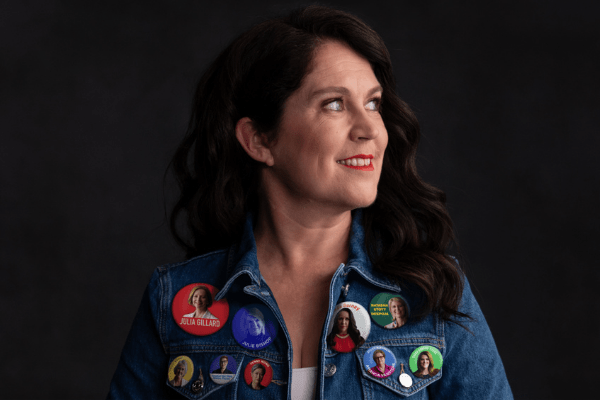On the morning of December 18, 1894, women’s rights opponent Mr Ebenezer Ward believed that with the passage of the Adult Suffrage Act, adding the clause allowing women not only to vote but to be candidates too, would kill the bill.
He was wrong.
The Bill passed 31 votes to 14, and South Australian women become the first in the world to both vote and run in elections.
It’s disabling and rather shocking to remember that it wasn’t that long ago when most people thought the idea of a woman in politics was ‘hilarious.’
I had no idea that it took until 1974 for the Senate to install ladies’ toilets, for instance.
Annabel Crabb has spent the last year interviewing prominent leaders, including Julie Bishop, Anne Aly, Linda Burney and Julia Gillard, to bring together a four-part tv series looking at the trajectory of women in politics since the first suffragettes started campaigning for women’s rights in Australia.
Despite their differing political views, Crabb’s interview subjects, which also include Natasha Stott Despoja, Amanda Vanstone and Penny Wong, all had similar stories regarding the way they were treated by men.
They were asked if they wanted to have children, while the male candidates would be getting married or expanding their families right before pre-selection.
In the first episode, we’re introduced to Joan Pilone, a woman whom, according to Crabb, we are “not supposed to have heard of.”
Pilone immigrated to Sydney from the UK in 1952 and made inquires to the Liberal Party for positions of leadership. She was told she needed to have ‘experience’. She won a seat on the North Sydney Council in 1959 and in 1962, she sought Liberal pre-selection for the State Parliament seat of Kirribilli. She was unsuccessful. Two years later, she was passed over again. And in 1965, she became the first woman to join the City of Sydney council.
She had all the right pedigree you’d think would make her next steps towards higher leadership smooth sailing. But that wasn’t the case.
In 1973, she nominated for a safe federal seat, only to be beaten by 34-year old Suburban solicitor by the name of John Howard, who had no experience serving in public office.
Crabb said in a statement that she wanted to mark the 2021 centenary of Edith Cowan’s election with “a documentary about women in Parliament.”
“I wanted to capture the stories that women in politics tell each other but often don’t share more widely, because of the disinclination most have to make their gender more of an issue than it already is,” Crabb writes. “Women in politics do get asked about gender; usually a handful of the same questions in the course of profile articles, but very rarely in an in-depth way, for a project like this one.”
In the Francine Act of 1902, Australia was the first independent nation in the world to grant women the right to vote, and run for parliament.
But there was an ugly proviso; “No Aboriginal native of Australia Asia Africa or the Islands of the Pacific except New Zealand shall be entitled to have his name placed on an Electoral Roll…”
“The language used then, in the parliament of Australia about my people, perhaps even relatives is something that makes me feel quite sick and it’s really upsetting,” Linda Burney says.
“How do you forgive this?” Asks Nova Peris, descendant of the Gija, Yawuru and Iwatja people who represented Australia in hockey and track and field, and was recruited for the Senate at the 2013 election by then prime minister Julia Gillard to represent the Northern Territory.
“But it was the times we lived in.”
Peris was the first Indigenous person to win Olympic gold, and the first Indigenous woman in the federal Parliament.
In the first episode, Crabb examines how female candidates campaigned in mid-century, and the excruciating ways they had to make themselves appear ‘normal’. Back then (and perhaps, depressingly, even now) a ‘normal’ woman is seen cooking, cleaning, doing the laundry — taking care of the management of the family home.
Joan Child, the first woman to be Speaker of the Australian House of Representatives, was often photographed in her home, seen washing the dishes, and posing next to her five sons, whom she raised alone after the death of her husband Hal Child, a business manager who died suddenly in the mid-1960s, leaving her a widow with her sons to raise – the eldest of them seventeen-years old and the youngest only seven. To keep the family sustained, she worked in factories, shops, as a cleaner and as a cook.
The episodes are just under 30 minutes each, and are an extremely eye-opening, confronting look at the history of women’s continuous struggle to be treated equally in the halls of power.
Watch the First Episode here, and the rest, on ABCiview. An accompanying podcast, with Annabel Crabb and Steph Tisdell, Not Designed for Women | Ms Represented with Annabel Crabb & Steph Tisdell, is also now streaming live.


